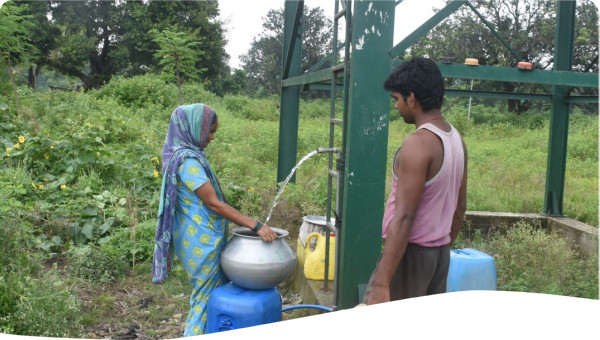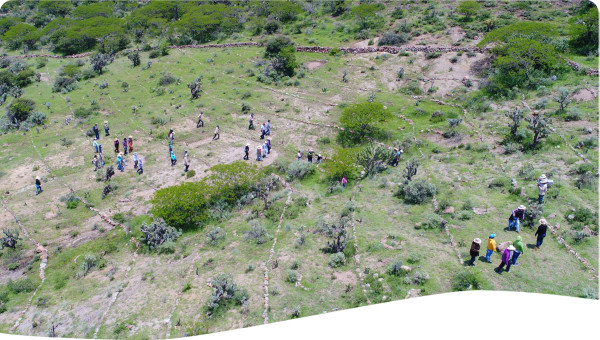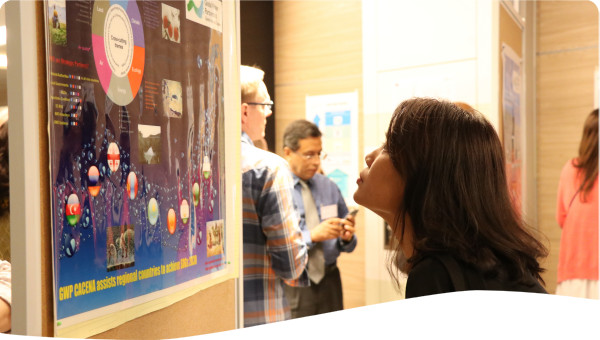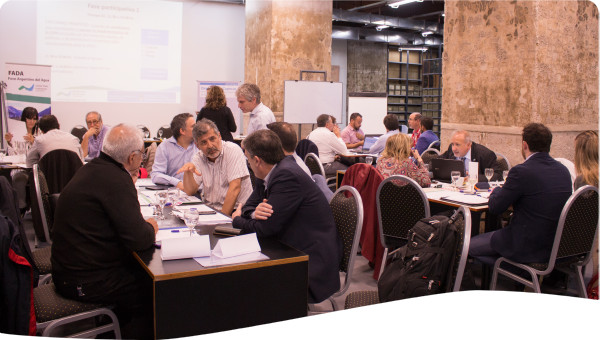Across India, the magnitude and intensity of extreme weather events like drought and floods is increasing. Such changes in climatic conditions affect a myriad of issues of which, access to water for drinking and domestic purposes and for agriculture affect farmer communities in South India the most, as majority of Indian farmers are dependent on rain fed agriculture.
In recent times, a drastic depletion of water levels is observable in the target states of Andhra Pradesh, Karnataka and Tamil Nadu in South India. Over the years, the situation has worsened with majority districts suffering from acute water shortage, which has led to conflicts, rising cases of farmer suicides and inter-state conflicts for access to water.
For many centuries, traditional water harvesting systems like irrigation tanks, farm ponds and Ooranies (surface water drinking ponds), etc. have met the water demands of the local population across India. Lack of ownership from authorities in charge of maintenance and protection of such water harvesting structures and apathy from the local population who use these services has led to a breakdown of these collection systems that help provide a counter-balance to water shortages.
Lack of water availability forces local population to walk three to five kilometres in search of water – a burden that usually falls on the shoulders of women. Despite isolated attempts to revive rainwater-harvesting structures, the problem has not been tackled in a systematic manner. In the given context, having efficient water-harvesting structures which can retain the runoff has been identified as a feasible solution to overcome water insecurity in the region and augment food security by supporting agricultural productivity.
DHAN Foundation, as a partner organisation to IWP/GWP-India helmed the WACREP sponsored programme to increase food and water security of highly vulnerable farmers, women and landless households in the southern states of Tamil Nadu, Andhra Pradesh and Karnataka in India from October 2013 – March 2015 (for a total of 18 months). Through the rehabilitation of 4 irrigation tanks in Tamil Nadu, construction of 17 farm ponds in Andhra Pradesh (11) and Karnataka (6) and deepening of 3 Ooranies in Tamil Nadu, it was aimed that climate resilience of affected communities will be raised as a result. In total nearly 1,350 households have improved access to sources of water.
The villages and beneficiaries were identified from two different agro-climatic zones (coastal and rural ecosystems) to gauge variabilities in adaptation to climate change. The project targeted 10 villages in seven districts across three southern Indian states: Ramanathapuram, Madurai, Sivagangai and Virudhunagar districts in Tamil Nadu, Chittoor district in Andhra Pradesh; Kolar and Bijapur district in Karnataka.
These interventions were carried out through community institutions called Vayalagams. Through the Vayalagam Farmer Organizations, DHAN facilitates rehabilitation of tanks for restoring physical structures to their originally designed standard, but more importantly, facilitating the proper maintenance of the tanks, efficient water management and implementing improved cropping practices in a sustainable manner. About 811 household units in the project locations were organised into social capital of Vayalagams.
The villages and beneficiaries were identified from two different agro-climatic zones (coastal and rural ecosystems) to gauge variabilities in adaptation to climate change. The project targeted 10 villages in seven districts across three southern Indian states: Ramanathapuram, Madurai, Sivagangai and Virudhunagar districts in Tamil Nadu, Chittoor district in Andhra Pradesh; Kolar and Bijapur district in Karnataka.These interventions were carried out through community institutions called Vayalagams. Through the Vayalagam Farmer Organizations, DHAN facilitates rehabilitation of tanks for restoring physical structures to their originally designed standard, but more importantly, facilitating the proper maintenance of the tanks, efficient water management and implementing improved cropping practices in a sustainable manner. About 811 household units in the project locations were organised into social capital of Vayalagams.
Community participation with contribution and consensus for implementation of context specific climate smart activities ensures success and builds resilience in climate-risk communities.
Collaboration and full-fledged support from the government and village panchayat is needed to evict encroachments in waterways, water bodies and agriculture lands.
The management of water resources for diverse uses should be done by adopting a participatory approach; by involving the user communities (youth, women and farmers) through community based organizations like Vayalagams, in the various aspects of planning, design, and development.
Even in deficient rainfall conditions, Ooranies can supplement the drinking water demand for many months. They help in groundwater recharge, increase water levels in wells and help improve the quality of water in the area nearby.
 Case studies
Case studies


